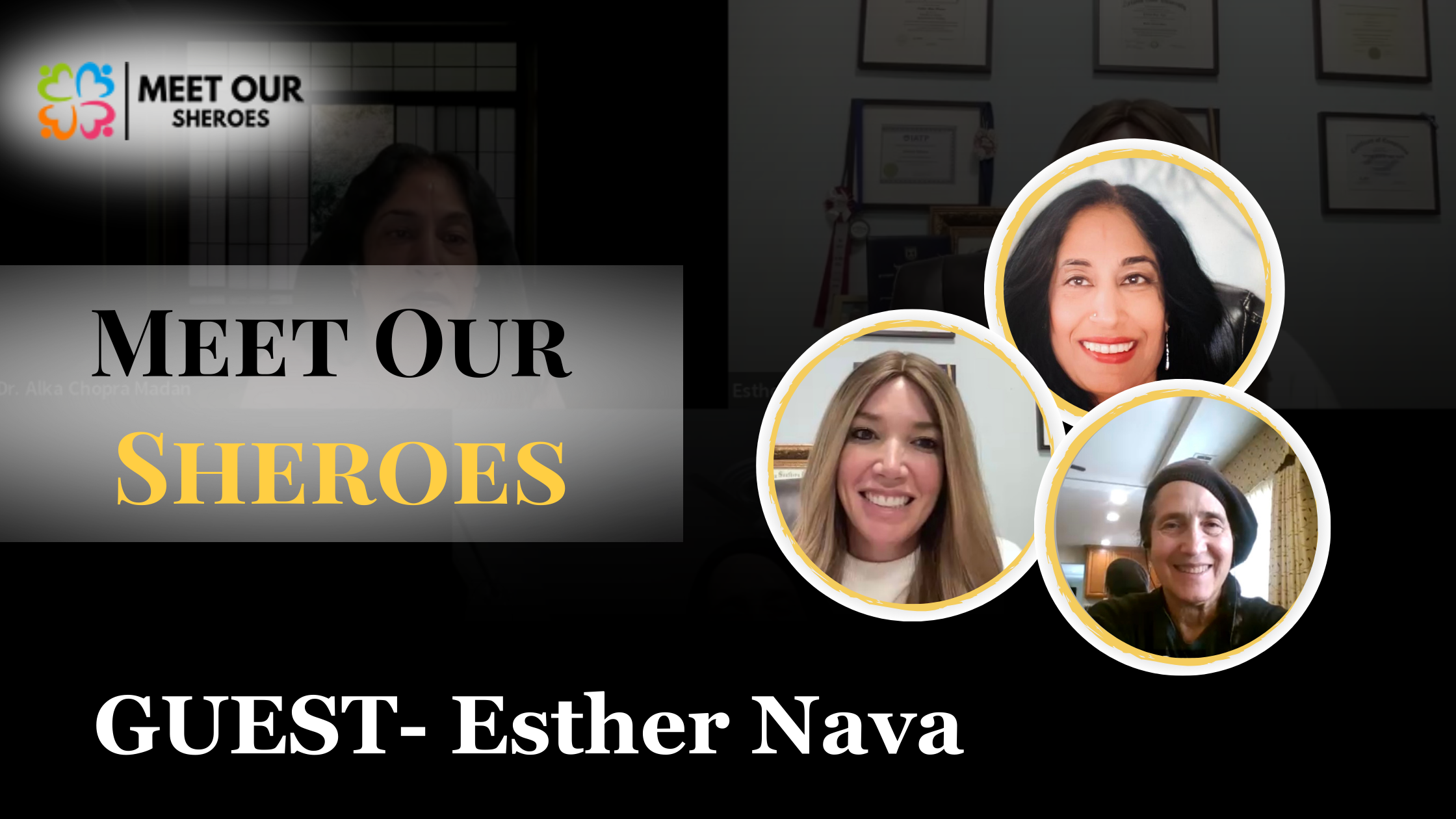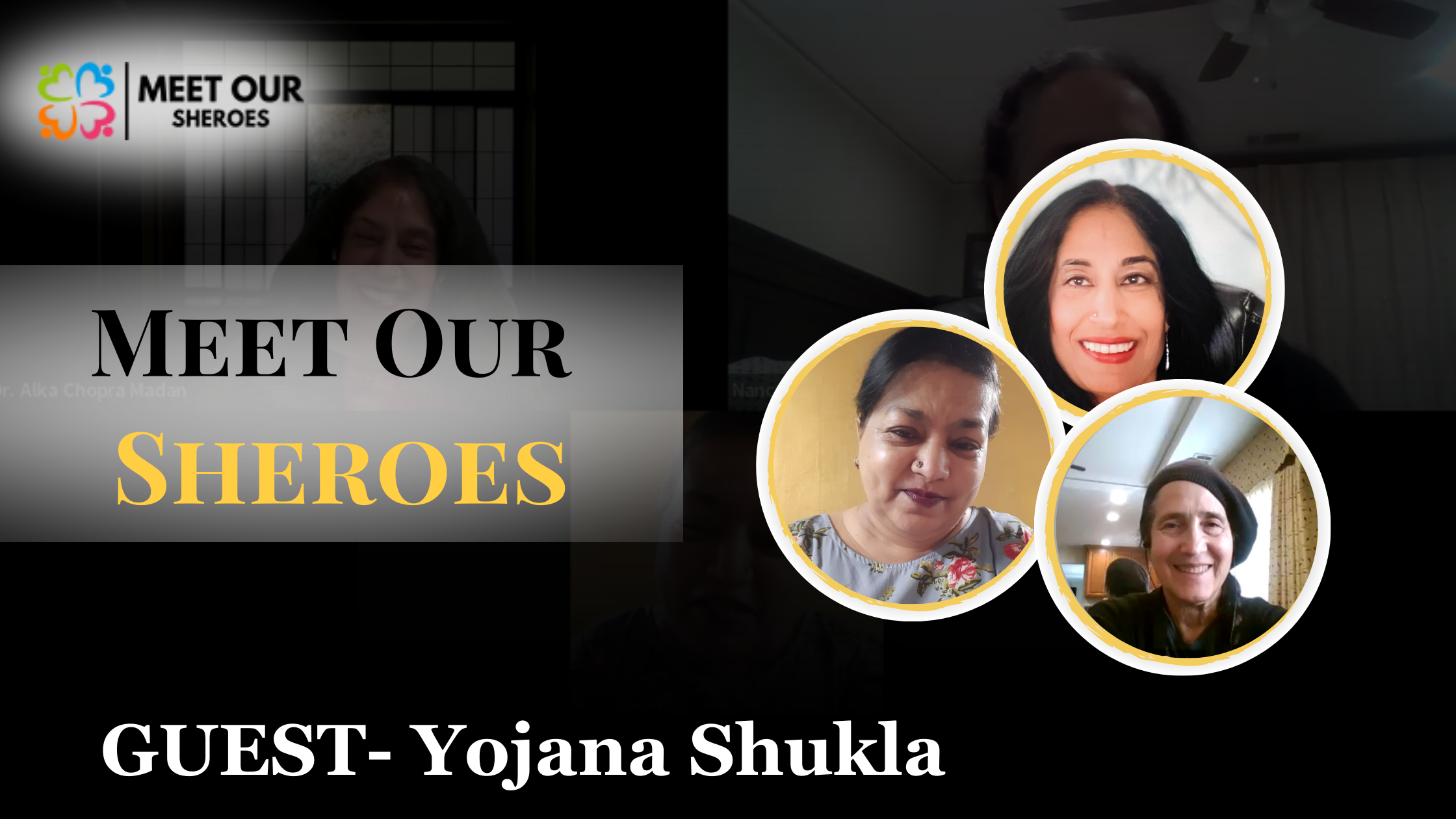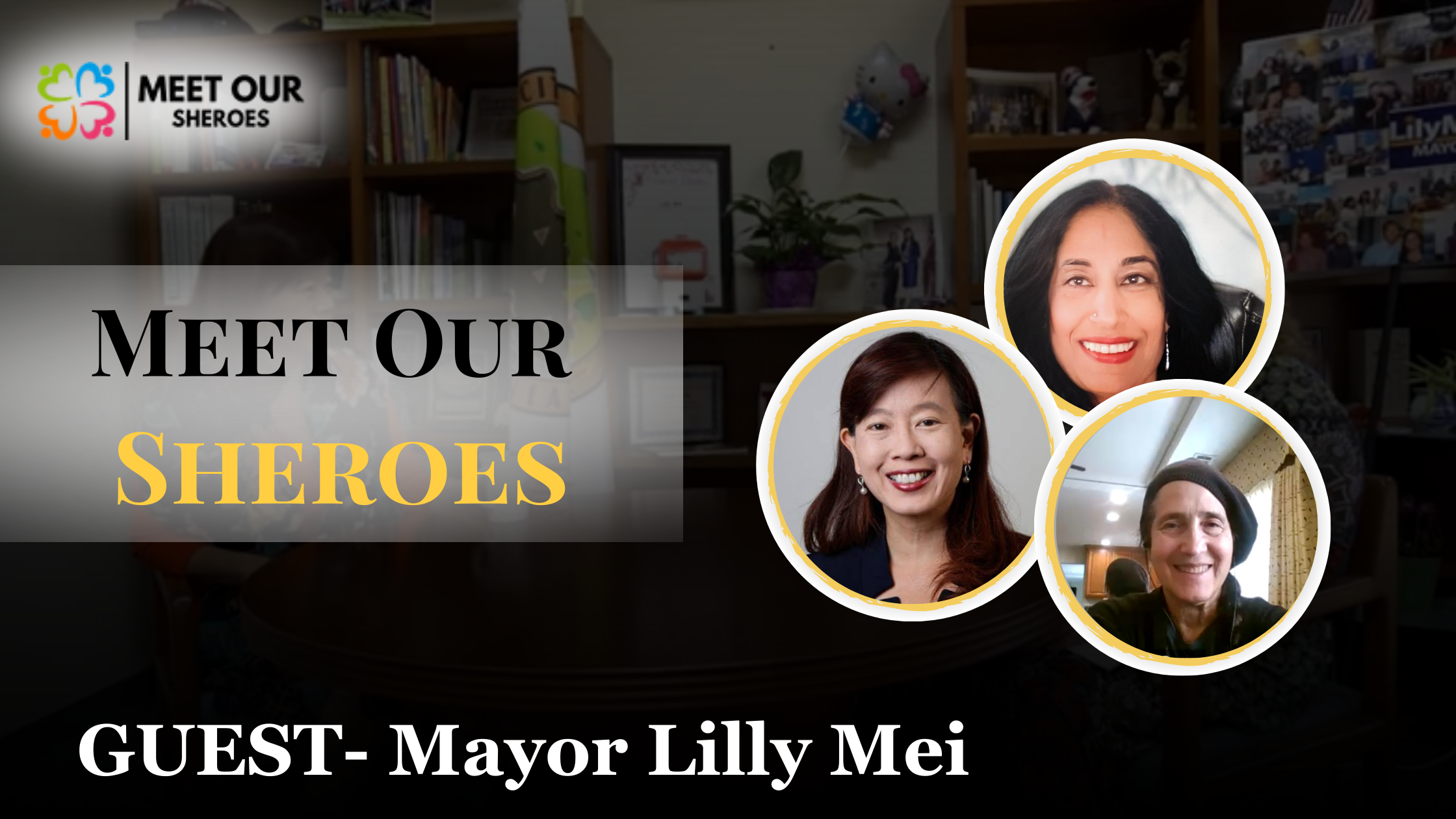At Global Women Power, the Meet Our Sheroes series is more than just an interview platform—it’s a space for authentic stories, where women from all walks of life share their personal journeys, triumphs, and challenges. Each conversation is designed to be open and unscripted, creating a natural flow that encourages real dialogue.
Dr. Alka Chopra Madan, the visionary behind the series, explains the unique format:
“The Meet Our Sheroes series is designed to be a platform where women share their inspiring journeys in their own words. We like to keep our conversations natural and unscripted”.
This open format has led to powerful, heartfelt conversations that showcase the resilience, strength, and leadership of each woman featured. From professionals in various industries to grassroots leaders and community builders, the series celebrates women who have made a meaningful impact in their fields and beyond.
Through Meet Our Sheroes, Dr. Alka and the team at Global Women Power aim to inspire others by sharing these diverse stories of empowerment. The hope is that each story resonates with the audience, motivating others to take bold steps in their own lives and careers.
In our latest Meet Our Sheroes interview, we had the privilege of speaking with Esther Adams A Roni, a licensed Israeli social worker and psychologist. Her incredible journey, from making Aliyah (immigration to Israel) to working with individuals in crisis, is one of resilience, empathy, and dedication. Esther’s work focuses on military resiliency and trauma-informed care, particularly during the tumultuous times of war in Israel.
Esther’s Journey: A Story of Service and Healing
Our conversation began with a simple, unscripted question:
“Could you share more about your journey, where it began, what you’re currently doing, and but rather than attributing her success to specific mentors, she spoke about the broader guiding forces in her life.
“I attribute my journey to a higher power, my guiding force. No specific mentor directed me. Regarding courses, maintaining a curious mindset is crucial. Stay curious about life, and it will lead you to new discoveries and joy.“
Esther’s response was a heartfelt reflection on her life and work.
“I’m Esther Adams A Roni, a licensed Israeli social worker residing in Israel. I made Aliyah about five years ago, holding a doctorate in psychology and a master’s in social work. My academic background focuses on military resiliency and crisis counseling, instilling a tone of trauma-informed care. As for my future plans, I aim to help as many people as possible, contributing to healing, especially during times like now, living in Israel amidst a war.
Breaking Barriers in a Challenging Domain
As the conversation unfolded, we delved into the dynamics of working in what is often considered a male-dominated field—trauma care within the military domain. When asked whether Israel’s military culture is seen as a “man’s world,” Esther shared her perspective on finding her place in this complex environment.
“I believe my perspective is unique. Working in my private practice allows me the freedom to make my schedule and choose my clients. I feel fortunate, but this autonomy took time to establish. Regarding clientele, I work with both men and women.”
In Israel, military service is a grassroots experience, involving ordinary people from all walks of life, making her work with both men and women crucial in addressing the mental health needs of the entire population.
The Power of Education and Curiosity
Esther, as both a woman and a mother, shared her hopes for the world, especially regarding peace and leadership.
“As a woman and a mother, I desire peace for every mother. Encouraging women to rise into leadership roles can change the world’s climate positively. The feminine aspect of giving life and wanting good things can make a significant impact.”
One of the key themes we explored in our conversation was whether women today are still suppressed in expressing themselves, or if there has been a shift toward self-definition. Esther provided insightful thoughts on this matter, based on her experiences with clients:
“In my therapy office, people aren’t suppressing; that’s why they’re here, to allow suppressed feelings to come out and feel free. Therapy can be empowering, alleviating suppression. In the world at large, it’s subjective. Some high-powered women dominate industries, while others find empowerment in being stay-at-home moms. My hope is that each woman feels empowered in her chosen path.”
Cultural and Religious Influences on Expression
Esther also discussed the complexity of women’s experiences worldwide, emphasizing that individual circumstances greatly influence their ability to express themselves:
“Various factors, like culture, religion, and family dynamics, play a role. It ultimately depends on the individual. Assessing the entire world or all women is challenging due to diverse circumstances. Women in suppressed environments may find their innate power by trusting a higher power and adopting a curious mentality.”
Embracing Choices Beyond Societal Expectations
As someone who has lived in various countries, Esther has seen firsthand the diverse choices women make in different cultural contexts. She reflected on how important it is to encourage women to explore options that go beyond traditional societal expectations:
“Having lived in different countries, I’ve observed the choices women make, sometimes sticking to societal expectations. Encouraging women to embrace choices that go beyond societal norms is crucial. Curiosity and choices are powerful tools.”
The Healing Power of Animal-Assisted Therapy
We also discussed Esther’s innovative use of animals, particularly horses, in her therapy practice. When asked how couples react to this method, she shared:
“I utilize horses, poodles, and dogs in therapy sessions at our farm in Israel. Couples usually come with at least one member being animal-oriented. The initial reaction is curiosity, seeking a connection with animals and nature. I provide that connection through animal-assisted therapy.”
Navigating the Therapeutic Landscape
Esther spoke about the unique dynamics of animal-assisted therapy, particularly with the bonding chemical present in interactions with cats.
“There’s a special chemical interaction between animals and humans. It’s fascinating how this therapy translates across cultures. I’ve practiced it in America and brought it with me to Israel.”
She explained her extensive background in animal therapy, mentioning her experience as a world national title competitor and her passion for working with animals, which she finds deeply fulfilling.
“This is my happy ground. I love interacting with animals and helping people.”
Offering Coaching and Support
The conversation shifted toward her work in coaching, both domestically and internationally. Esther elaborated on her telehealth services and the need for less regulated therapy environments:
“I do international coaching, which is distinct from therapy. Therapy involves processing trauma, while coaching focuses on the present and future. It’s important for individuals to recognize the difference.”
She noted that while some countries lack regulations for therapists, there are opportunities for women to learn and pursue coaching as a career: “Having laid out a coaching program, I can support people in achieving their goals, even if I don’t offer a certification program. My focus is on helping them take the next steps.”
Reflections on the Ongoing Conflict
As the conversation progressed, we touched upon the impact of the ongoing conflict in Israel. Esther expressed her concerns regarding mental health and community resilience:
“From a mental health aspect, I’m worried about Israel’s resilience. I’ve launched a free online course to boost resiliency, addressing both collective and individual experiences of trauma.”
Explaining the symptoms of acute stress disorder and the potential for chronic adjustment disorder in a war environment and emphasizing the importance of community support, she said: “I’ve witnessed incredible resilience among women who come together to support soldiers and each other. This unity is a powerful response to the challenges we face.”
Navigating Personal Struggles with Positivity
Despite the challenges she faces, including personal struggles with her son’s health and past experiences of loss, Esther maintains a hopeful and positive outlook on life. She emphasized the importance of joy and resilience:
“My joy is within me, and it’s something I fight for every day. My journey has not been without struggle, but I choose to embrace happiness and hope.
The Role of Animal-Assisted Therapy in Healing
Esther has a deep connection with animals, which has shaped her career in unique ways. “I’ve always loved working with animals, and they’re a central part of my therapeutic approach,” she explained. In Israel, where she now practices, Esther trains her own black Arabian horses, incorporating them into her sessions. Through animal-assisted therapy, Esther helps clients experience calm and connection—a bond that she believes brings comfort to both people and animals. “Animals, especially horses, have a unique ability to sense and respond to human emotions,” she shared, adding that this natural intuition helps her clients find peace even amidst chaotic surroundings.
Mental Health Support Through Telehealth
In addition to animal-assisted therapy, Esther provides telehealth coaching to clients around the world. “Telehealth has become essential,” she emphasized. “It allows me to reach people who may not otherwise have access to mental health support.” Esther’s work focuses on coaching rather than traditional therapy, guiding clients toward setting personal goals and creating actionable steps for the future. She explained, “In coaching, we don’t delve into past trauma; instead, we focus on the here and now, building resilience and planning for a positive future.”
Interestingly, Esther noted that in some countries, like Israel, there are fewer regulations around therapy, making telehealth coaching an option for international clients who might face obstacles accessing licensed therapy in their own countries. “It’s about meeting people where they are,” she said, emphasizing her commitment to providing accessible and impactful support.
Launching a Resilience-Building Course
Understanding the importance of resilience, especially in conflict zones, Esther recently launched a free, ten-module online resilience course. “This course is psychoeducational; it’s not therapy,” she clarified. “It gives people tools to identify stress symptoms and offers practical steps for coping.” The course covers:
– Physical Activities: Encouraging regular exercise as a way to release stress and boost mood.
– Cognitive Practices: Mindfulness and positive reframing exercises to help manage anxious thoughts.
– Nutritional Advice: Exploring how diet can support mental well-being.
Community Engagement: Emphasizing the importance of building a support network.
Esther shared that this course is especially relevant now, as people are dealing with acute and, potentially, chronic stress. “Acute stress disorder can last up to three months, but in situations of ongoing conflict, the risk of this turning into chronic stress is real,” she explained. “This course is designed to help people manage their symptoms early on and build resilience.”
Unity and Community Resilience in Times of Conflict
One of the most heartening aspects of the current situation, Esther observed, is the collective resilience shown by communities. “The solidarity and support we’re seeing is incredible. People are organizing meal trains, fundraising for soldiers, and filling in where they’re needed,” she said. These acts of kindness and support go a long way, not only in providing immediate help but also in fostering emotional resilience.
Esther’s Call to Action: Focus on Mental Health
In her parting words, Esther urged individuals to prioritize mental health and reach out for help when needed. “If you’re experiencing symptoms of chronic stress, like anxiety, isolation, or fatigue, don’t hesitate to seek support,” she advised. She invites anyone interested to explore her resilience course and learn more about her work at [stridestosolutions.com](http://stridestosolutions.com), where she provides additional resources and guidance.
Esther’s approach to resilience, grounded in community, compassion, and animal-assisted therapy, is a powerful reminder of the strength within each of us—even in the most challenging times.
The Philosophy of Fighting for Joy
In a poignant moment, Esther spoke about her approach to joy, describing it as an active pursuit. “Fighting for joy,” she explained, isn’t just about experiencing happiness; it’s a commitment to embracing positivity despite life’s adversities. Her personal journey illustrates that joy can be reclaimed—even during difficult times—and that it often requires intentionality and resilience.
Resources for Mental Health and Resilience
For those seeking guidance on their mental health journeys, Esther offers a wealth of resources. Her blog, rich with articles on various aspects of mental wellness, serves as a supportive space for readers to explore topics ranging from emotional resilience to everyday self-care. Additionally, she provides a free resilience course on her website, equipping individuals with tools to manage stress and navigate life’s complexities.
Currently, Esther’s resilience course and blog are available in English. However, she expressed her desire to expand these resources to make them accessible to a wider, more diverse audience. With plans to reach out in multiple languages, Esther aims to ensure her message resonates with and supports even more people around the world.
Building a Faith-Based Community
Nancy highlighted Esther’s active role on Facebook, where she leads a group called Women and Will Not Builders. This community, welcoming people from all faiths and backgrounds, provides a space for positive reinforcement and prayer, with group activities like reading Psalms. According to the listener, “miracles and healings happen” within this group—a testament to the power of shared support and encouragement. Esther’s community-building efforts foster a sanctuary where individuals find comfort, strength, and healing.
Wisdom Through Shared Experiences
Expressing gratitude for the praise, Esther underscored the value of shared wisdom. She encouraged listeners to explore her blog and connect with her online community, emphasizing that the advice and insights shared stem from lived experiences. Her message reminds us that sometimes, the best guidance comes from those who’ve walked a similar path.
As the conversation concluded, Esther extended her appreciation for the opportunity to share her journey. She invited listeners to remain connected, reach out for support, and engage with her blog and social platforms for ongoing inspiration. Her final message was one of empowerment: even in tough times, we can all choose joy and build resilience by supporting one another.
Esther Nava’s story illuminates the resilience found in community and the power of choosing joy. Her work not only supports mental health but also underscores the importance of faith, strength, and shared experiences. Through her blog and resilience course Esther provides tools and guidance for individuals to find their own joy amidst adversity. Her journey is a testament to the fact that, with the right mindset and support, resilience is within everyone’s reach.
Esther’s story serves as an inspiring reminder of the power of resilience, compassion, and the potential for healing, even amidst the most challenging circumstances. Her commitment to empowering others and fostering healing through her work is a testament to the strength of the human spirit.




